|
/back
British Sailorsí Society
These photographs were taken in 1951 when the Barry Sailorsí Rest celebrated its
Diamond Jubilee. Mr C J Crix generally known as Jack, was the Port
Missionary/Manager there at the time. He was appointed in August 1945 having
spent two or three years as Port Missionary/Manager at Ipswich Sailorsí Rest. My
father remained there until 1954, when he took over the King Edward VII Hall in
London. In 1956, he became an Appeals Organizer based in N.W. London.
|
Charles John Crix
Charles John Crix was born on 2nd January 1894 on Foulness Island but the family
moved to Burnham-on-Crouch by the time he was six. During the First World War,
he served in the Merchant Navy as a cook and, after the war, as a pastrycook in
Walworth, South London. He married Mildred Deavin in 1920.
In 1927 he joined the London City Mission and after a short probationary
period took over Milton Hall, an evangelical gospel hall in Battersea. He was
transferred to Nunhead, in Peckham, in 1935 but in 1941, when the blitz was at
its height, he resigned and became a Rest Centre Manager, looking after people
who had been bombed out of their homes.
Somewhere about 1942 he joined the British Sailorsí Society and became Port
Missionary/Manager of the Sailorsí Rest at Ipswich and remained there for the
rest of the war. The Rest not only served sailors coming into the Ipswich docks
but also Royal Naval seamen based at Harwich so the Rest was very busy during
this period.
In August 1946, he was moved to Barry in South Wales and served there until
October 1954. The Sailorsí Rest celebrated its 60th Anniversary whilst he was
there and this was what prompted these photographs to be taken. He then,
briefly, managed the King Edward VII Hall in Cromwell Road, Kensington before
becoming an Appeals Organizer in January 1956.
He died in 1959, the day after
his 65th birthday.
|
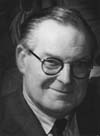 |
|
Barry Sailorsí Rest
Barry Docks was built as a rival to Cardiff to export coal from the
Welsh coalmines. But as the coal industry declined, so did the docks
and, as the docks declined, the need for a Rest declined. In the 1950ís,
the Sailorsí Rest was still fairly active but the decline had
already started.
Photo by Bromhead (Bristol) Ltd of 157 Whiteladies Road, Bristol
click on each image to
enlarge |
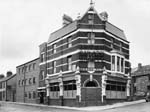

|
|
Billiard Room
This was actually a multi-purpose room: a games room, and a lounge. It was the
venue for a traditional Dinner on Christmas Day as the canteen was not normally
big enough to accommodate everybody. Any sailors coming into port at this time
would normally go home if they possibly could, though the Rest was open (as on
every other day of the year) but there were always quite a few people around.
Once (and only once to my recollection) a ship docked late on Christmas Eve and
public transport had stopped so men could not get home. So my father had a
particularly busy day ensuring they had as good a Christmas as possible.
Photo by Bromhead (Bristol) Ltd of 157 Whiteladies
Road, Bristol
click on image to enlarge
|
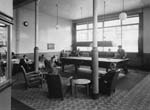
|
Shop
This was in the billiard room and sold basic toiletries and snacks when the
canteen was not open.
Photo by Bromhead (Bristol) Ltd of 157 Whiteladies
Road, Bristol
click on image to enlarge
|
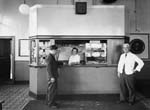
|
Canteen
The canteen, with the kitchen behind it, could cater for about two
dozen people.
Photo by Bromhead (Bristol) Ltd of 157
Whiteladies Road, Bristol
click on image to enlarge |
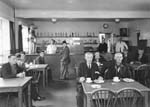
|
|
Writing Room
The writing and reading rooms, separated by a partition, were usually opened up
to make one room. It was also sometimes used as a chapel and there were weekly
film shows during the winter and a Film Service on Sundays. This view is looking
towards the large bay window.
Photo by Bromhead (Bristol) Ltd of 157
Whiteladies Road, Bristol
click on image to enlarge
|
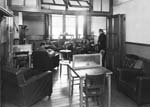
|
Reading Room
This is taken looking towards the Writing Room.
Photo by Bromhead (Bristol) Ltd of 157
Whiteladies Road, Bristol
click on image to enlarge
|
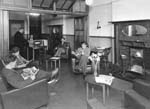
|
|
Film Show
The film shows, of standard feature films that had been released on 16mm, were
always very well attended. We didnít normally have the mayor, of course, and
this was almost certainly a film show as part of the Diamond Jubilee
celebrations in 1951. The committee and other dignitaries are all sitting in the
comfortable armchairs at the front whilst the sailors are at the back.
It is not known who took this photograph
click on image to enlarge |


|
Lifeboat Launch
My father, as Port Missionary, was always taken out at Christmas in the Barry
lifeboat to the Breaksea lightship, moored in the Severn Estuary. It was
dependent on the weather as, although the lifeboat could always launch, if the
sea was heavy it was impossible to get aboard the lightship. He took presents
with him and held a short service on board.
Photograph by Reginald Piper, 261 Holton Road,
Barry
click on image to enlarge
|
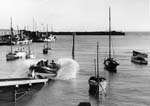 |
|
Ipswich Sailorsí Rest
From about 1942-1945, my father managed the Sailorsí Rest at Ipswich. It was an
interesting building but unfortunately the only photograph I have of it is this
one of the main lounge. The grey suited young man sitting in an armchair on the
right is my brother, Fred. He was in the Royal Navy at the time and evidently
was home on leave. I am skulking behind the counter.
Photograph by St.Lawrence Studios, Ipswich
click on image to enlarge
|
 |
King Edward VII Hall
After his time at Barry, my father was moved to The King Edward VII Hall a
hostel for trainees.
According to a note on the back of this photograph, he was there from Oct 1954 -
Dec 1955.
Photography probably by Bernard Crix
click on image to enlarge |
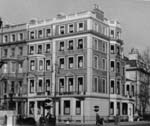
|
|